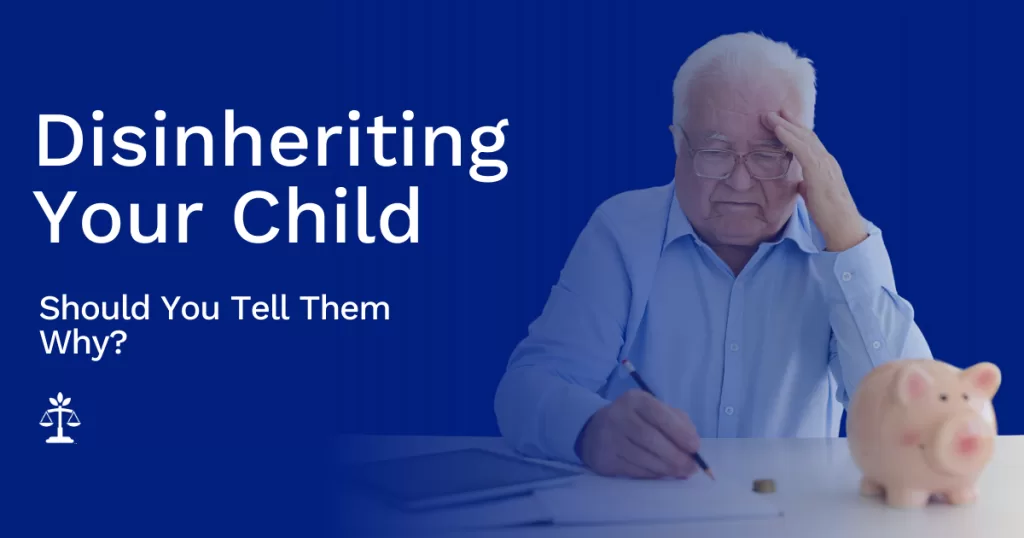Look, I’ve been practicing estate law for over twenty years, and I can tell you that disinheriting a child is one of the toughest calls a parent can make. It’s not something folks do on a whim. If you’re staring down this decision right now, you’re probably wrestling with whether you should explain yourself to your kid or just let the will do the talking.
Here’s the straight answer: legally, you don’t owe anyone an explanation. Your money, your choice. But I’ve seen enough family blowups over surprise disinheritances to know that the legal answer isn’t always the smart one.
Why Parents Cut Their Kids Out
Before we dive into the communication piece, let’s be real about why parents disinherit their children in the first place:
- – Bad blood – Maybe you haven’t spoken in years, or every conversation ends in a screaming match. I’ve had clients who haven’t talked to their kids in decades. Family rifts run deep, and sometimes there’s just too much water under the bridge to repair things.
- – Money problems – Your kid burns through cash like it’s kindling, has gambling issues, or struggles with addiction. I’ve seen parents agonize over this one – they want to help their child but worry an inheritance would just fuel destructive behaviors. It’s a heartbreaking position to be in.
- – Already paid their share – You put them through an expensive college, bailed them out of debt multiple times, or helped them buy a house while their siblings got zilch. One client of mine had already given his oldest son nearly $300,000 in “early inheritance” while his other kids had received nothing. His will aimed to balance the scales.
- – Trust issues – You just don’t believe they’ll handle the money responsibly. Maybe your daughter has a manipulative spouse who controls the finances, or your son has made one bad investment after another. You worked hard for your money and want it respected.
- – Someone else needs it more – Your spouse, your grandkids, or a charity you believe in could use those resources better. I had a client who disinherited her financially successful children to leave everything to her disabled grandchild who needed lifetime care.
- – Tax and legal angles – Sometimes the math just works out better with different distribution strategies. Estate planning isn’t just about feelings – it’s about maximizing what you’re leaving behind.
Whatever your reason, make damn sure it’s documented properly. The last thing you want is your wishes being ignored because of sloppy paperwork. I’ve seen too many estates torn apart by vague language and half-baked plans.
The Emotional Punch of Being Cut Out
I’m going to be blunt here – being disinherited feels like getting kicked in the teeth. Even if your relationship with your kid is already on the rocks, finding out they’ve been deliberately excluded from your will can feel like a final slap in the face.
I’ve witnessed the aftermath countless times. The adult child who discovers at the reading of the will that they’ve been cut out completely. The shock. The hurt. The anger that quickly turns to rage. And that rage? It doesn’t just disappear – it finds targets, usually other family members.
I’ve seen disinheritances tear families apart long after the funeral. Siblings who were once close stop speaking. Thanksgiving dinners become battlegrounds. Christmas cards go unsent. Grandkids grow up not knowing their cousins. And sometimes, the hurt and confusion drives people straight to a lawyer’s office to contest the will.
One family I worked with didn’t speak for fifteen years after the father disinherited his youngest son without explanation. The son was convinced his siblings had influenced the decision, and the relationship never recovered. The sad truth? The father had actually left him out because he’d already paid for his son’s business, which was worth more than what the other kids were inheriting. A simple explanation could have saved that family.
That’s why, in my professional opinion, most parents should consider explaining their decision somehow, even if the conversation will be uncomfortable as hell.
Making the Call: To Explain or Not?
While you can legally keep your mouth shut about disinheriting your kid, here’s why speaking up might save everyone a world of hurt:
1. It Prevents the "WTF?" Moment
Without warning, your kid is going to assume one of two things when they find out they’re disinherited: either you made a mistake, or you delivered one final act of rejection from beyond the grave. Neither scenario plays out well. A heads-up eliminates the shock factor.
I had a client whose mother had disinherited her without explanation. For years, she believed it was because her mother secretly blamed her for her father’s death (he’d had a heart attack while visiting her). The truth? Her mother had left everything to charity because my client was financially secure while the charity was struggling. My client spent years in therapy dealing with unnecessary guilt.
2. It Can Keep You Out of Court
Let’s face it – people who feel blindsided and hurt are more likely to lawyer up and challenge your will. While a solid estate plan can usually withstand these challenges, do you really want your legacy to be depleted by legal fees while your family dukes it out in court? An explanation – especially one that’s documented – can dial down the odds of a contest.
Court battles over estates are ugly, expensive, and drag on forever. I’ve seen estates worth a few hundred thousand dollars rack up fifty grand in legal fees during contests. That’s money that should be going to your beneficiaries, not paying for attorneys to argue about your intentions.
3. It Might Preserve Some Family Peace
Your other kids are going to get stuck dealing with the fallout if one sibling is unexpectedly cut out. An explanation from you can help take some heat off them and clarify that this was your decision, not some conspiracy among your other children.
I can’t tell you how many times I’ve watched executors – usually the siblings who weren’t disinherited – bear the brunt of another sibling’s anger. They’re the ones who have to enforce your wishes while dealing with their brother or sister’s hurt feelings. It’s a thankless job, and an explanation from you can make it a little less brutal.
How to Break the News
If you’ve decided to explain, you’ve got options:
The Face-to-Face
If you’re on speaking terms, sitting down and having an honest conversation is probably the most respectful approach. Fair warning: expect emotions to run high. Keep it straightforward, stay calm, and try to make it clear this isn’t about punishing them – it’s about making the best decision for your estate.
I recommend doing this in a private setting, not at a family gathering or public place where things could get messy. Have the conversation well in advance of your passing, when there’s still time for processing and maybe even resolution.
The Letter
Sometimes putting pen to paper is easier than stumbling through a difficult conversation. A letter gives you time to choose your words carefully and gives your kid space to process their feelings without having to react immediately. Be clear but compassionate – remember, this is your kid, after all.
One client wrote individual letters to each of her children explaining different aspects of her estate plan. The daughter who was receiving less had been given substantial financial help during her divorce, and the letter acknowledged this while expressing love. It wasn’t easy for the daughter to read, but it prevented misunderstandings later.
The Digital Time Capsule
Some of my clients record video messages explaining tough estate decisions. There’s something powerful about being able to see someone’s face and hear their voice when they’re explaining a difficult choice. It feels more personal than legal documents and can convey nuances that might get lost in writing.
I’ve had feedback from families that these videos were incredibly meaningful – they captured the parent’s personality and made the explanation feel more intimate and sincere. Plus, there’s less room for misinterpretation when you can hear tone and see facial expressions.
The Legal Route
You can include a brief explanation directly in your estate documents. It won’t win any awards for warmth, but it gets the job done and reinforces your intentions if there’s ever a legal challenge.
Just be careful with the language here. “I’m disinheriting Robert because he’s a disappointment” might feel satisfying to write, but it could fuel resentment and legal challenges. Stick to factual statements like “I’ve chosen not to include Robert in my will because I’ve already provided for him through his education and business startup costs.”
Making Sure Your Wishes Stick
If you’re dead-set on disinheriting your child, here’s how to make it bulletproof:
- – Spell it out – Don’t be vague. Your will should specifically state that you are intentionally not providing for this child. Name them explicitly. “I have intentionally made no provision for my son, Thomas J. Smith” is much clearer than “I have chosen to distribute my assets to some of my children.”
- – Consider a no-contest clause – This basically says anyone who challenges the will gets nothing. It’s not enforceable everywhere, but it can be a strong deterrent. I’ve seen these clauses stop contests before they start, especially if the disinherited person was going to receive even a small bequest.
- – Keep your plan current – Review your estate documents regularly. Family relationships change, and your plan should reflect your current wishes. I recommend revisiting your estate plan every 3-5 years or after major life events.
- – Hire a pro – This isn’t DIY territory. Get an experienced estate planning attorney who knows all the pitfalls and how to avoid them. A $50 online will isn’t going to cut it for something this complex. I’ve cleaned up too many messes from people trying to save a buck on their estate planning.
Bottom Line
Look, disinheriting a child is one of those decisions that will keep you up at night. There’s no legal requirement to explain yourself, but in my experience, some form of communication usually leads to less family drama and fewer legal headaches down the road.
I’ve guided hundreds of clients through this process over the years. The ones who took the time to explain their decisions – whether through conversations, letters, or videos – generally left behind more intact families than those who let the disinheritance come as a surprise.
If you’re in Central Texas and this is the road you’re heading down, my firm knows how to navigate these choppy waters. We’ll make sure your wishes are honored while minimizing the fallout. Schedule a consultation today, we’ll talk through your specific situation and make sure your legacy is exactly what you intend it to be, no more and no less.

